You found our list of the best personal finance books.
Personal finance books are resources that help individuals gain financial literacy and attain their financial goals. Examples include The Intelligent Investor by Benjamin Graham and Secrets of the Millionaire Mind by T. Harv Eker. The purpose of these resources is to help individuals make better money decisions by focusing on topics like spending, income, investments, and saving.
Personal finance books are similar to sales books, franchise books, and business finance books. These books can improve employee financial wellness.
This list includes:
- personal finance books for beginners
- personal finance books for young adults
- personal finance books for employees
- best selling personal finance books
Let’s get started!
List of personal finance books
Whether you want to master the principles of budgeting or learn more about the stock market, we have a variety of great books on personal finance. From The Psychology of Money by Morgan Housel to The Little Book of Common Sense Investing by John C. Bogle, here is a list of resources that guide readers in their personal finance journey.
1. Introducing Personal Finance: A Practical Guide by Michael Taillard
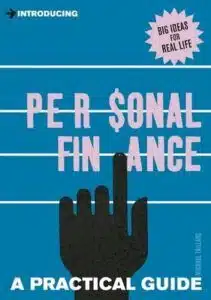
Introducing Personal Finance is a fantastic pick of personal finance books for beginners. Michael Taillard, an economist expert, shares tips and tricks every individual needs to manage their finances better. The author also provides practical advice to help readers earn, save, and maximize their investments. Some of the lessons the book offers include controlling spending habits, setting saving goals, and simplifying financial management.
Notable quote: “Financial management actually has very little to do with money—money is just a unit of measurement—financial management is about taking control of your life.”
Read Introducing Personal Finance.
2. The Intelligent Investor by Benjamin Graham, Jason Zweig, and Warren Buffett
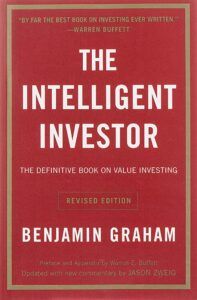
Authored by the greatest investors of the 20th century, The Intelligent Investor is a great pick of personal finance books for employees. The book has vital finance lessons, including the authors’ popular value investing philosophy. Benjamin Graham uses this philosophy to shield individuals from costly mistakes and reinforce the importance of long-term strategies. Readers will also get vital insights from Warren Buffet, one of the most successful investors in the world. Buffet has interesting lessons on bonds and selecting investment companies. With the revised edition, readers also get insights into today’s markets through Jason Zweig’s commentary.
Notable quote: “You must thoroughly analyze a company, and the soundness of its underlying businesses, before you buy its stock; you must deliberately protect yourself against serious losses; you must aspire to ‘adequate,’ not extraordinary, performance.”
Read The Intelligent Investor.
Get our free team building toolbox
- icebreaker games
- bingo cards
- DIY guides
 by teams at FedEx, Amazon, Deloitte and 73,930+ others
by teams at FedEx, Amazon, Deloitte and 73,930+ others

3. The Psychology of Money by Morgan Housel
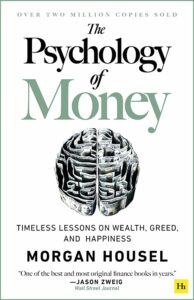
The Psychology of Money guides readers on the best behavior around money. Morgan Housel argues that financial success does not revolve around what individuals know. Rather, success depends on an individual’s behavior. The author also notes that folks learn personal finance, investing, and business decisions through a math-based field, but they lack practical know-how in the real world. The Psychology of Money includes 19 short stories exploring strange ways individuals view money. The book teaches readers how to capitalize on the most important topics in life.
Notable quote: “Less ego, more wealth. Saving money is the gap between your ego and your income, and wealth is what you don’t see. So wealth is created by suppressing what you could buy today in order to have more stuff or more options in the future. No matter how much you earn, you will never build wealth unless you can put a lid on how much fun you can have with your money right now, today.”
Read The Psychology of Money.
4. Rich Dad, Poor Dad by Robert T. Kiyosaki and Sharon L. Lechte
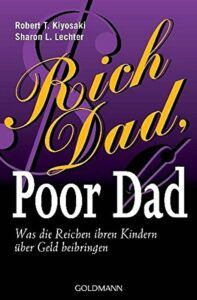
Rich Dad, Poor Dad, is one of the best selling personal finance books. The book follows Robert T. Kiyosaki’s early life story with two dads, his birth father and his best friend’s dad. The authors show contradicting beliefs and practices around money and investing between the two fathers. Rich Dad, Poor Dad explains the variance between having money work for you and working for money. The book also advocates the importance of financial independence, literacy, and intelligence in business and personal finance.
Notable quote: “‘I can’t afford it’ shut down your brain. It didn’t have to think anymore. Besides, it also brings up sadness. A helplessness that leads to despondency and often depression. ‘How can I afford it?’ opened up the brain. Forced it to think and search for answers. It also opens up possibilities, excitement and dreams and created a stronger mind and dynamic spirit.”
Read Rich Dad, Poor Dad.
5. Secrets of the Millionaire Mind: Mastering the Inner Game of Wealth by T. Harv Eker
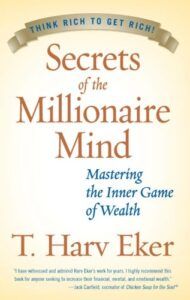
Secrets of the Millionaire Mind offers unforgettable lessons that readers can learn from the wealthy. The book explores why some individuals get rich quickly while others face financial struggles throughout their lives. As opposed to common beliefs, factors like work, level of education, contracts, luck, timing, and skills play an insignificant role in an individual’s success. Rather, the authors explore the habits and behavior of some of the most successful entrepreneurs in 17 wealth files. As a result, readers will learn how the wealthy act and think differently than those facing financial struggles. The authors also explain the steps individuals who yearn for financial independence can take to change their money blueprint.
Notable quote: “If your motivation for acquiring money or success comes from a nonsupportive root such as fear, anger, or the need to ‘prove’ yourself, your money will never bring you happiness.”
Read Secrets of the Millionaire Mind.
6. The Millionaire Next Door: The Surprising Secrets of America’s Wealthy by Thomas J. Stanley and William D. Danko
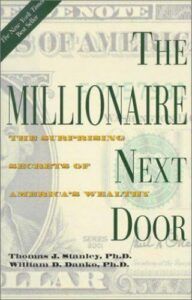
The Millionaire Next Door is a great pick of personal finance books for young adults. The authors aim to increase readers’ net worth through practical lessons based on the real world. In the book, readers will learn to spot the rich based on an individual’s lifestyle. For instance, individuals will recognize millionaires based on what they do, drive, and wear. Through this exercise, readers will learn that millionaires focus on increasing their wealth by living below their means. Other notable lessons that The Millionaire Next Door teaches include efficiently allocating energy, time, and resources and focusing on financial independence versus high social status. The book also equips young adults with tips on leveraging market opportunities and choosing a suitable occupation.
Notable quote: “Have you ever noticed those people whom you see jogging day after day? They are the ones who seem not to need to jog. But that’s why they are fit. Those who are wealthy work at staying financially fit.”
Read The Millionaire Next Door.
7. Smart Women Finish Rich: 9 Steps to Achieving Financial Security and Funding Your Dreams by David Bach
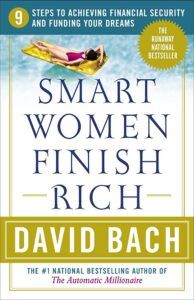
Smart Women Finish Rich is a guide for women who want to take control of their finances and finish rich. David Bach, a renowned financial advisor, outlines vital money lessons for women of all backgrounds and ages. The author’s nine-step program provides readers with tools for establishing financial security, budgeting, and aligning money with individual values. Additional financial lessons from the book include why and how to teach kids about money, new ways to attract wealth, and advice on long-term investments. The book is a fantastic resource for individuals from diverse financial backgrounds, from persons with a significant inheritance to those struggling financially.
Notable quote: “Don’t ever put your entire financial fate in someone else’s hands.”
Read Smart Women Finish Rich.
8. A Random Walk Down Wall Street: The Time-Tested Strategy for Successful Investing by Burton G. Malkiel
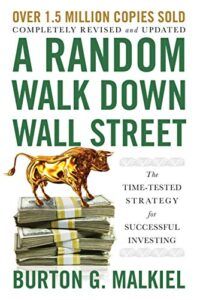
As one of the best personal finance books for young adults, A Random Walk Down Wall Street provides tactical investment advice for readers. Burton G. Malkiel offers gimmick-free tips on vital investment sectors. For instance, the author discusses tax management, risk parity, factor investing, and the Bitcoin bubble. Readers will also get handy lessons on stocks and bonds, home ownership, real estate investment trusts, and tangible assets like gold. A Random Walk Down Wall Street is a must read for individuals looking for a stress-free investment journey.
Notable quote: “Look for growth situations with low price-earnings multiples. If the growth takes place, there’s often a double bonus—both the earnings and the multiple rise, producing large gains. Beware of very high multiple stocks in which future growth is already discounted. If growth doesn’t materialize, losses are doubly heavy—both the earnings and the multiples drop.”
Read A Random Walk Down Wall Street.
9. The Little Book of Common Sense Investing: The Only Way to Guarantee Your Fair Share of Stock Market Returns by John C. Bogle
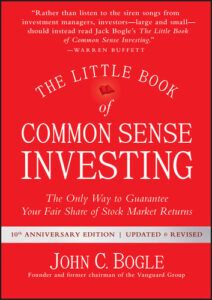
If you want to be a wiser investor, then The Little Book of Common Sense Investing is a great pick. Readers will get investing advice from John C. Bogle, founder of the Vanguard Group. The author urges investors to peruse the guide rather than hire investment managers with no guarantee of significant returns. Investors will learn tips on how to overcome the impact of taxes, investment costs, and inflation. Readers will also get insights into investment fads, including indexing gimmickry.
Notable quote: “An investment in knowledge always pays the best interest. Learning is to the Studious, and Riches to the Careful. If a man empties his purse into his head, no man can take it away from him.”
Read The Little Book of Common Sense Investing.
10. Think and Grow Rich by Napoleon Hill and Ben Holden-Crowther
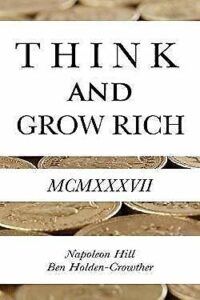
As one of the best selling personal finance books, Think and Grow Rich provides strategic investment advice. Authored following the Great Depression, the book provides tips that individuals can use to navigate difficult financial periods. The authors illustrate money principles from millionaires and share lessons on how the rich achieve and grow their wealth. The book provides plans and principles to help individuals transform thoughts into riches. For instance, readers will learn to visualize, affirm, define goals, and plan effectively.
Notable quote: “To win the big stakes in this changed world, you must catch the spirit of the great pioneers of the past, whose dreams have given to civilization all that it has of value, the spirit that serves as the life-blood of our own country—your opportunity and mine, to develop and market our talents.”
Read Think and Grow Rich.
11. Meet the Frugalwoods: Achieving Financial Independence Through Simple Living by Elizabeth Willard Thames

One of the main causes of the lack of financial independence is impulse purchases. Elizabeth Willard Thames explains that most individuals are stuck in their personal finance journeys due to the need to impress with material possessions. Meet the Frugalwoods guides readers through ways to achieve liberation and self-confidence by eliminating the culture of the typical good life mentality. The resource follows the story of how Thames and her husband will achieve a lifestyle of sustainable frugality and attain financial independence.
Notable quote: “We’re taught we can pay for everything we need. Our very lives can be purchased, and by extension, we can buy the rights to a fragmented community of like-minded consumers. Our unifying activity as a culture is shopping, and the one thing we all are is consumers.”
Read Meet the Frugalwoods.
12. The Simple Path to Wealth: Your road map to financial independence and a rich, free life by J.L. Collins

The Simple Path to Wealth is a fantastic choice of personal finance books for employees. The author uses simple scenarios to change how readers think about money and instill the desire to build wealth through sustainable avenues. Collins explores the risks of debt and why every investor must avoid it. Readers also learn about the stock market and how to invest in raging bear or bull markets. Employees will also get handy tips on navigating target retirement funds, required minimum distributors, and health saving accounts. Other notable teachings in The Simple Plan to Wealth are working with investment firms or advisors, asset allocation, and con investments.
Notable quote: “Here are a few key guidelines to consider: Spend less than you earn—invest the surplus—avoid debt. Do simply this and you’ll wind up rich. Not just in money. Carrying debt is as appealing as being covered with leeches and has much the same effect.”
Read The Simple Path to Wealth.
13. The Richest Man in Babylon by George S. Clason
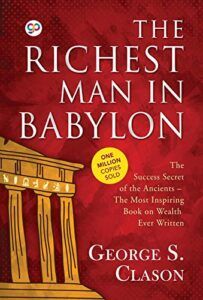
With over two million books sold, The Richest Man in Babylon is a popular read worldwide. George S. Clason reveals the top secrets to personal wealth that any individual can harness. The book uses simple and fascinating stories to touch on diverse topics, such as financial planning and personal wealth. One of the most essential personal finance lessons the author explores is the importance of saving a certain amount of all income. Other lessons that the books provide are increasing one’s ability to earn and controlling expenses.
Notable quote: “Wealth, like a tree, grows from a tiny seed. The first copper you save is the seed from which your tree of wealth shall grow. The sooner you plant that seed the sooner shall the tree grow. And the more faithfully you nourish and water that tree with consistent savings, the sooner may you bask in contentment beneath its shade.”
Read The Richest Man in Babylon.
14. I Will Teach You to Be Rich: No Guilt. No Excuses. No BS. Just a 6-Week Program That Works by Ramit Sethi
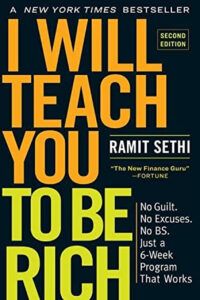
I Will Teach You to Be Rich is a fantastic selection of personal finance books for beginners. With the six-week program, Ramit Sethi teaches readers how to make more, save more, and live their desired life. The author also provides vital lessons to help readers crush debt and student loans faster and save. I Will Teach You to Be Rich also entails an investment strategy that can drive returns without the help of financial investors. In the new edition, the resource also includes updated tools and insights into the psychology of money.
Notable quote: “Frugality, quite simply, is about choosing the things you love enough to spend extravagantly on—and then cutting costs mercilessly on the things you don’t love.”
Read I Will Teach You to Be Rich.
Conclusion
Personal finance remains a major challenge for individuals across the globe. Even with great salaries and business returns, most folks often need help with budgeting, debt, and investing. Rather than making dreadful mistakes with your finances, you can learn from some of the most successful individuals and personal finance coaches worldwide. Personal finance books often include practical advice and inspiring stories that will motivate readers to act. With a strong foundation in personal finance, readers can support their life goals, such as saving, living debt-free, and starting businesses.
Next, check out our list of business books, negotiation books, and pricing books.




